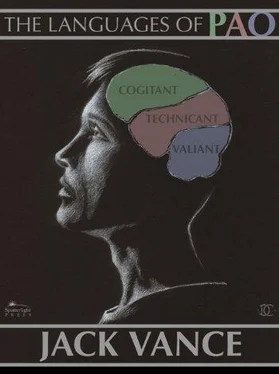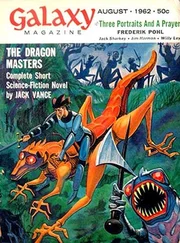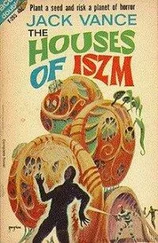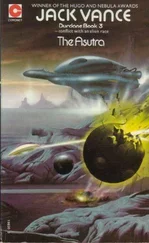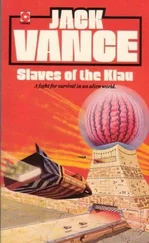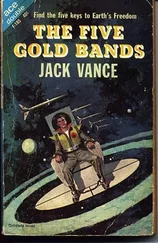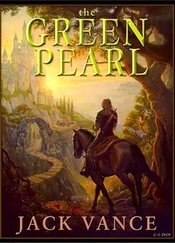Beran frowned. “We Paonese are not careless in such matters. Our dress is established, and no one would wear a costume unfamiliar to him, or one which might cause misunderstanding.”
A smile broke the austere cast of Fanchiel’s face. “True, true; I forgot. The Paonese make no virtue of conspicuous dress. And—possibly as a corollary—mental abnormality is rare. The Paonese, fifteen billion of them, are pleasantly sane. Not so the people of Vale. They live to complete spontaneity—in clothes, in conduct, in language. The question arises: does the language provoke or merely reflect the eccentricity? Which came first: the language or the conduct?”
Beran admitted himself at a loss.
“In any event,” said Fanchiel, “now that you have been shown the connection between language and conduct, you will be anxious to learn the language of Breakness.”
Beran was unflatteringly dubious. “Would I then become like you?”
Fanchiel asked sardonically, “A fate to be avoided at all costs? I can relieve your anxiety. All of us change as we learn, but you can never become a true man of Breakness. Long ago you were shaped into the Paonese style. But speaking our language, you will understand us—and if you can think as another man thinks, you cannot dislike him. Now, if you are ready, we commence.”
On Pao there was peace and the easy flow of life. The population tilled their farms, fished the oceans, and in certain districts sieved great wads of pollen from the air, to make a pleasant honey-tasting cake. Every eighth day was market day; on the eight-times-eighth day, the people gathered for the drones; on the eight-times-eight-times-eighth day, occurred the continental fairs.
The people had abandoned all opposition to Bustamonte. Defeat at the hands of the Brumbos was forgotten; Bustamonte’s taxes were easier than those of Aiello, and he ruled with a lack of ostentation befitting his ambiguous accession to the Black.
But Bustamonte’s satisfaction at the attainment of his ambition was not complete. A dozen aspects of his new life exasperated him; fears he had never suspected affected him with an intense disquiet. An impulsive man, his reaction to these unpleasant stimuli was often more violent than the occasion demanded. He was by no means a coward, but personal safety became an obsession; a dozen casual visitors who chanced to make abrupt motions were exploded by Mamarone hammer-guns. Bustamonte likewise imagined himself the subject of contemptuous jest, and other dozens lost their lives for displaying a merry expression when Bustamonte’s eye happened to fall upon them. The bitterest circumstance of all was the tribute to Eban Buzbek, Hetman of the Brumbos.
Each month Bustamonte framed a stinging defiance to send Eban Buzbek in lieu of the million marks, but each month caution prevailed; Bustamonte, in helpless rage, despatched the tribute.
Four years passed; then one morning a red, black and yellow courier ship arrived at the Eiljanre spaceport, to discharge Cormoran Benbarth, scion of a junior branch of the Buzbeks. He presented himself at the Grand Palace as an absentee landlord might visit an outlying farm and greeted Bustamonte with casual amiability.
Bustamonte, wearing the Utter Black, maintained an expressionless face with great effort. He made the ceremonial inquiry: “What fortunate wind casts you upon our shores?”
Cormoran Benbarth, a tall young bravo with braided blond hair and magnificent blond mustaches, studied Bustamonte through eyes blue as cornflowers, wide and innocent as the Paonese sky.
“My mission is simple,” he said. “I have come into possession of the North Faden Barony, which as you may or may not know is hard against the south countries of the Griffin Clan. I require funds for fortification and recruitment of followers.”
“Ah,” said Bustamonte. Cormoran Benbarth tugged at the drooping blond mustache.
“Eban Buzbek suggested that you might spare a million marks from your plenty, in order to incur my gratitude.”
Bustamonte sat like an image of stone. His eyes held the innocent blue gaze for thirty seconds while his mind raced furiously. Submission to the extortion might entice an endless series of needy clansmen to the palace. The idea was intolerable. But could he deny this young brigand without fear of retaliation?
To Bustamonte’s devious Paonese mind, it was inconceivable that the request could be anything other than a demand backed by an implicit threat of violence, to which he could offer no resistance. He threw up his arms in frustration, ordered forth the required sum and received Cormoran Benbarth’s thanks in baleful silence.
Benbarth returned to Batmarsh in a mood of mild gratitude; Bustamonte’s fury induced an abdominal acerbation, and his resolve to defy the Brumbos became the guiding force of his life.
* * *
Bustamonte spent moody weeks in reflection. It presently became clear that he must swallow his pride and petition those whose offices he had once rejected: the dominies of Breakness Institute.
Assuming the identity of an itinerant engineer, Bustamonte took passage to the depot planet Journal and there boarded a packet for the voyage through the outer Marklaides.
Presently he arrived at Breakness. A lighter came up to meet the packet. Bustamonte gratefully departed the cramped hull, and was conveyed down through gigantic crags to the Institute.
At the terminus he encountered none of the formalities which gave occupation to a numerous branch of the Paonese civil service; in fact he was given no notice whatever.
Bustamonte became vexed. He went to the portal, looked down across the city. To the left were factories and workshops, to the right the austere mass of the Institute, in between the various houses, manors and lodges, each with its appended dormitory.
A stern-faced young man—hardly more than a lad—tapped him on the arm, motioned him to the side. Bustamonte stepped back as a draft of twenty young women with hair pale as cream moved past him. They entered a scarab-shaped car, which slid away down-slope.
No other vehicle could be seen, and the terminal was now almost empty. Bustamonte, white with anger, the knobs of muscles twitching in his cheeks, at last admitted that either he was not expected, or that no one had thought to meet him. It was intolerable! He would command attention; it was his due!
He strode to the center of the terminus, and made imperious motions. One or two persons paused curiously, but when he commanded them in Paonese to fetch a responsible authority, they looked at him blankly and continued on their way.
Bustamonte ceased his efforts; the terminus was vacant except for himself. He recited one of the rolling Paonese curses, and went once more to the portal.
The settlement was naturally unfamiliar; the nearest house was a half-mile distant. Bustamonte glanced in alarm toward the sky. The little white sun had fallen behind the crag; a murky fog was flowing down Wind River; light was failing over the settlement.
Bustamonte heaved a deep breath. There was no help for it; the Panarch of Pao must tramp his way to shelter like a vagabond. Grimly he pushed open the door, and stepped forth.
The wind caught him, wheeled him down the lane; the cold ate through his thin Paonese garments. He turned, ran on his short thick legs down the lane.
Chilled to the bone, his lungs aching, he arrived at the first house. The rock-melt walls rose above him, bare of opening. He trudged along the face of the building, but could find no entrance; and so crying out in anguish and rage, he continued down the road.
The sky was dark; small pellets of sleet began to sting the back of his neck. He ran to another house, and this time found a door, but no one responded to his pounding. He turned away, shivering and shaking, feet numb, fingers aching. The gloom was now so thick he could barely distinguish the way.
Читать дальше
